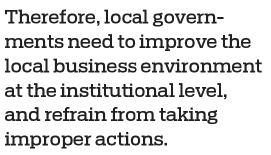Private sector can accelerate recovery with policy support
The Chinese economy's recovery is expected to gain pace this year, with private small and medium-sized enterprises playing an important role in the process. However, SMEs need good policy support to do that.
That the Chinese economy will grow at a healthy rate this year is also borne out by the 2023 Government Work Report, which has set the GDP growth target at around 5 percent for 2023 with intensified and more targeted macroeconomic policies to promote a stable economic growth.
First, private enterprises are a key driver of the Chinese economy. According to National Bureau of Statistics data, in the first 11 months of 2022, the cumulative operating income and cumulative operating profit of State-owned industrial enterprises were 2.93 trillion yuan ($422.04 billion) and 158.43 billion yuan respectively. On the other hand, the operating income of private industrial enterprises was 47.67 trillion yuan and the operating profit 2.17 trillion yuan.
Second, privately-owned SMEs employ a large number of people. In 2021, while urban employment touched 467.73 million, China's micro, small and medium-sized enterprises accounted for 99.8 percent of all large-scale corporate legal entities and 79.4 percent of all corporate employment.
Third, privately-owned SMEs also inject new vitality into China's economy because they are closer to the market and more sensitive to the economy, despite being relatively small in scale. Due to their relatively simple organizational structure, they can respond to the market's demands and adjust their production and operation strategies more quickly. They are also more open to trying out new business models and adapting to advanced, untested technology.
But the private SMEs' ability to avoid or overcome risks is relatively weak. According to the National Bureau of Statistics, the purchasing managers' index (PMI) of SMEs in 2022 ought to have been lower than those of large enterprises. In the first 11 months of 2022, the average monthly manufacturing PMI of large enterprises was 50.4 percent, and the average monthly manufacturing PMI of medium-sized enterprises and small enterprises was 49.3 percent and 46.9 percent respectively. The difference between large and small businesses was 3.5 percentage points.
In 2019, before the pandemic broke out, the monthly average manufacturing PMI of large industrial enterprises was 2.6 percentage points higher than that of their small counterparts. This shows small enterprises have been hit much harder by the pandemic.
But this year, the Chinese economy is showing clear signs of a strong recovery, and SMEs, in spite of being the main force behind the recovery, require policy support to play their due important role in that recovery — although sporadic COVID-19 infections could still disrupt the recovery.
In terms of rent reduction and tax reduction and exemption, the previous preferential policies for private SMEs, such as rent reduction for office space, and reduction and exemption of "six taxes and two fees", should continue.
In addition to direct policy support, indirect subsidies and support should also be provided for the SMEs. For example, the tourism industry which was badly hit by the pandemic, should receive both direct and indirect subsidies — perhaps in the form of coupons for tourists for accommodation and transportation, which hopefully will help increase the number of tourists, thereby boosting the business of SMEs in the tourism industry.
Due to the generally low credit level of private SMEs and insufficient collateral, it is difficult for many of them to obtain loans. So the government should expand various financing channels, improve the financing system for private SMEs, and explore different methods to grant loans to SMEs.
Private SMEs also face problems in dealing with local governments, which harm their operations, especially because the lack of improvement in the business environment in some places has pitted private enterprises, including private SMEs, against local governments. As a result, disadvantaged private SMEs suffer the most. Therefore, local governments need to improve the local business environment at the institutional level, and refrain from taking improper actions.
In this regard, however, the Government Work Report says China will also encourage and support the private sector and private businesses in growing and expanding, and support micro, small and medium-sized enterprises and self-employed individuals in business development.
All this suggests the Chinese economy will grow at a healthy pace this year and in the coming years.
The views don't necessarily represent those of China Daily.


The author is an assistant researcher at the Institute of World Economics and Politics, Chinese Academy of Social Sciences.














